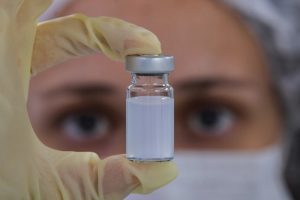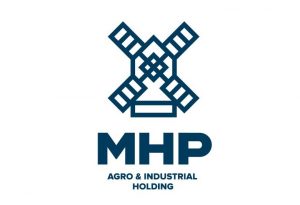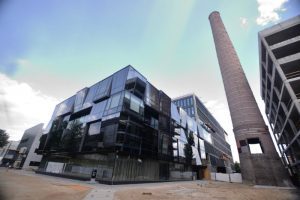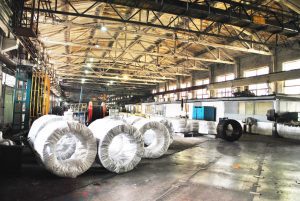
The pharmaceutical group of companies Yuria-Pharm is considering the possibility of localizing vaccine production in Ukraine.
Director General of Yuria-Pharm pharmaceutical corporation Dmytro Derkach told Interfax-Ukraine that the company is actively working on the issue of providing the Ukrainian population with vaccines, including the vaccine against COVID-19.
“Five years ago, construction began on a new plant in Cherkasy with a total area of more than 25,000 square meters, which provides for high-tech aseptic production and production of biotechnological products. The workshops of the new production site have been launched starting in 2020,” he said.
According to Derkach, the construction of the new facility became possible “thanks to the principle that the company has adhered to since its inception: to reinvest over 80% of profits in new directions, which is more than $25 million per year, and also thanks to a loan from the European Bank for Reconstruction and Development (EBRD ) obtained in 2020.
He said that a prerequisite for the development of the production of biotechnological products was the developments of its own Biotech R&D, in particular, a technological platform for the development and pilot production of recombinant protein products, monoclonal antibodies. In addition, a hardware and methodological base was established to ensure quality control of biopharmaceuticals and vaccines, both of our own production and solutions of contract partners.
Yuria-Pharm is also testing its own platform for the development of RNA-based drugs as an effective, modern, safe and fast drug development method, which, in particular, has been used by companies that have become pioneers in the development of an RNA vaccine against COVID-19.
“We are now actively working on the issue of finding partners for the transfer of technology for the production of vaccines from COVID-19 to our new production site. We have selected a pool of companies for this, including from the United States and China, whose development is in the late stages, in particular in the third phase of clinical trials. We are negotiating with them to select a potential candidate for technology transfer and provide them with our production facilities,” Derkach said.
The director general of the group clarified: “We are not developing our own vaccine, since at present there are more than 130 companies in the world at various stages of developing a vaccine against COVID-19, so we are looking for a candidate among them.”
But at the same time, he believes that the pharmaceutical industry of Ukraine should be potentially ready for the transfer and industrial production of vaccines, the development of which will eventually be offered by domestic research institutes.
The group of companies Yuria-Pharm is included in the list of the largest pharmaceutical companies in Ukraine. The main areas of activity are the development (R&D,) production, marketing and distribution of drugs and medical products.
Yuria-Pharm LLC is a member of the Association of Manufacturers of Medications of Ukraine (AMMU).

Myronivsky Hliboproduct agricultural holding (MHP) received a net loss of $133 million in 2020 versus a net profit of $215 million in 2019, mainly due to exchange rate losses of $204 million due to the annual depreciation of hryvnia by 16%, and the company’s revenue decreased by 7%, to $1.91 billion.
According to the quarterly financial statements of the holding, released on London Stock Exchange on Wednesday, its adjusted EBITDA and operating income decreased by 7%, respectively, to $395 million and $201 million, while the profitability of sales (EBITDA margin) remained at the 2019 level of 21%.
The agricultural holding noted the impact of exchange rate losses in the amount of $204 million on the company’s financial indicators, saying that excluding exchange rate differences, the company’s net profit in 2020 would have been $71 million against $30 million in 2019.
MHP said that in 2020, export revenue decreased by 9.1%, to $1.015 billion, which is 53% of total revenue (56% of total revenue in 2019).
The agricultural holding said that the situation in export markets has deteriorated significantly due to several outbreaks of bird flu in early and late 2020 and the effect of coronavirus (COVID-19) pandemic throughout the year.
In the fourth quarter of 2020, MHP reduced its net loss by 60%, year-over-year, to $24 million, its total revenue decreased by 10%, to $497 million, and export revenue decreased by 19.3%, to $255 million (51% of total revenue).
MHP’s gross profit in the fourth quarter of 2020 increased by 44%, year-over-year, to $75 million, operating profit amounted to $7 million against an operating loss of $2 million, however EBITDA decreased by 10%, to $63 million.
Chief Executive Officer of the company Yuriy Kosyuk said in the statement that the company managed not only to adapt to the serious challenges of 2020, but also to become more resilient and take advantage of new opportunities. He said that as part of the strategic shift announced a year ago towards more customer-oriented products, including with additional processing and added value, for the domestic market of Ukraine and some export markets, the company launched a number of pilot projects for culinary transformation, including Meat Market convenience stores and DönerMarket houses.
“These offerings are at an early pilot stage and I look forward to updating you on progress in due course as this model is rolled-out more extensively over the next several years, transforming the group’s sales […] to a branded value-added base,” Kosyuk said.
According to the report, revenue for the company’s main chicken production segment in 2020 decreased by 5%, to $1.298 billion, and gross profit due to a decrease in meat prices by 30%, to $191 million, EBITDA by 31%, to $194 million. In the fourth quarter, sales in this segment decreased by 3%, to $328 million, while gross profit and EBITDA due to higher prices for cereals fell 66.7%, to $15 million and $14 million, respectively.
In the crop production segment, MHP’s revenue fell by half in 2020 due to a lower harvest, to $134 million, but due to price increases, gross profit increased 3.2 times to $94 million, and EBITDA by 38%, to $150 million.
In meat processing, sales over 2020 decreased by 3%, to $144 million, while gross profit and EBITDA remained at the same level of $19 million and $20 million, respectively. In the fourth quarter, revenue in this segment decreased by 10%, to $38 million, gross profit by 44%, to $5 million and EBITDA by 38%, to $5 million.
At the same time, the company managed to achieve significant improvement in the performance of Slovenian Perutnina Ptuj and its operations in Croatia and Serbia, which are reported as a European operating segment. Its revenue in 2020 increased by 24%, to $335 million, gross profit by 21%, to $93 million, EBITDA by 25%, to $55 million. In the fourth quarter, sales increased by 12%, to $87 million, gross profit by 5%, to $22 million, and EBITDA remained at $15 million.
In terms of other indicators, the company said that its capital investments in 2020 decreased by 30%, to $79 million, available cash from $341 million to $218 million, and net debt increased from $1.139 billion to $1.244 billion.
In its forecast, MHP said the prospects for the development of poultry farming in 2021 will be very difficult, given the ongoing COVID-19 crisis, weak economic conditions, high feed prices, a very active winter season for bird flu and global oversupply, however the company is confident in its business.
“Transformation to a culinary company: MHP is expanding its focus. The experience of global poultry producers supports MHP’s strategic shift to a culinary company. Moreover, we are transforming our relationship with retail, HoReCa and franchisees in order to reach more customers and meet their evolving needs by providing them with new safe and high quality products. Current challenges have led us to accelerate this strategic shift,” the company said in the report.
The company said that its continued vertical integration provides a significantly lower cost base compared to peers in the industry, as well as improved quality control and better biosecurity of poultry stock, and added that the demand for poultry meat is growing globally along with the decline in demand for red meat.
With regard to possible mergers and acquisitions (M&A), the agricultural holding indicates that it continues to monitor global developments and the potential for mergers and acquisitions. “MHP is well positioned to become an active participant in the ongoing consolidation of the industry,” the company said in the report.
MHP is the largest chicken producer in Ukraine. It is also engaged in the production of cereals, sunflower oil, meat products. MHP supplies the European market with chilled half-carcasses of chickens, which are processed, including at its factories in the Netherlands and Slovakia.

The UNIT.City innovation park, together with the official importer of BMW and MINI in Ukraine AWT Bavaria, are launching the U.Go service – a new model of short-term rental (car sharing) of electric vehicles for the park residents, the press service of the importing company reported.
UNIT.City is reportedly serving as a testing ground for this pilot project, and Kyiv is the first city to test the new car-sharing model.
The service can now be used by residents and employees of the UNIT.City park, who have a driver’s license and have more than two years of driving experience.

PJSC Production Association Stalkanat-Silur (Odesa), following the results of work in 2020, reduced its net profit by 21.3% compared to 2019 – to UAH 116.761 million from UAH 148.419 million.
According to the company’s announcement of the annual meeting of shareholders on April 26, its outstanding loss at the end of the year amounted to UAH 151.677 million.
Over the past year, the plant reduced its current liabilities by 27% – to UAH 812.295 million, long-term liabilities amounted to UAH 130.162 million. At the same time, accounts receivable decreased by 4.5% – to UAH 142.596 million.
According to the announcement, the assets of Stalkanat-Silur in 2020 decreased by 3% – to UAH 1.7 billion, including fixed assets decreased by 3.5% – to UAH 1.3 billion.
The draft decisions of the meeting say that shareholders are invited to leave the profit received in 2020 unallocated.
PJSC Stalkanat-Silur produces steel, nylon ropes and metal goods.

The perception of Ukraine in the United States is balancing on the verge of positive and negative impressions, when the fascination with promising human potential, the desire for freedom and European choice is overshadowed by constant references to the level of corruption and various political twists and turns, according to the analytical report Perception of Ukraine Abroad, carried out by the Ukrainian Prism Foreign Policy Council and commissioned by the Ukrainian Institute. “In general terms, conventionally political narratives significantly prevail over cultural ones, and the perception of Ukraine is formed either in the context of current political news [which are often associated with Russia], or through the prism of the Soviet past,” according to the analytical report, presented at a press conference in Kyiv on Wednesday.
Maidan/Euromaidan, an attempt to annex Crimea, information war, corruption, revolution, war with Russia, oligarchs, and “Trump-Zelensky scandal” often arise among associations from the political level. Among the cultural associations, people mainly name vyshyvanka (embroidered shirt), borsch (traditional dish), the Kyiv-Pechersk Lavra, traditions, modern literature, and architecture.
It is noted that respondents emphasized little general awareness of Ukrainian culture among Americans in the United States and blurred images. Awareness of the cultural diplomacy of Ukraine in general is also quite low.
The findings of the analytical report on the perception of Ukraine in Turkey indicate the limited (sometimes on the verge of lack) knowledge about the history, culture, art of Ukraine, and the basic knowledge concerns political events at the present stage.
“The traditional perception of Ukraine as part of a wider post-Soviet space [which is gradually changing] and a clear link to Russia [in different contexts – from a common cultural heritage with Russia and a professional art and scientific school to the complete opposition of two political cultures and the struggle for independence from Moscow],” the report said.
Attention is also drawn to the insufficient presence of Ukrainian topics in the Turkish media, public space, and expert and academic circles amid a powerful propaganda work on the part of Russia. In addition, the report notes the positive attitude of Turkish citizens towards Ukraine and Ukrainians and the openness of all respondents to new knowledge and experiences related to Ukraine, interest in developing cooperation, and readiness for further mutual understanding.
The findings of the analytical report regarding Japan indicate that there is a general low level of awareness about Ukraine in Japan, which was mentioned by almost every respondent.
“Due to limited information about Ukraine and a low level of awareness of Ukrainian culture and history, perceptions of Ukraine in Japan are often sufficiently formed through the Russian context,” the report said.
In particular, some items of Ukrainian culture are attributed to Russia, for example, respondents often emphasized that in Japan borsch is often considered Russian.
In addition, the events of 2014 in Crimea and Donbas, as well as the war with Russia, which continues in eastern Ukraine, in a certain way influenced the perception of Ukraine as an unstable state with a problematic state of security. One of the cornerstones in the perception of Ukraine is the topic of Chornobyl in connection with the understanding of the scale of the tragedy and its “proximity” to the accident at the Fukushima-1 nuclear power plant in 2011.
At the same time, negative associations around the war and Chornobyl are balanced by the positive attitude of the Japanese towards Ukrainians as friendly people with a light character.

President of Ukraine Volodymyr Zelensky has signed decree No. 116/2021 “On the temporary introduction of a visa-free regime for citizens of the People’s Republic of China who enter Ukraine for tourist purposes,” the presidential website reported.
According to the document, in order to develop friendly relations between Ukraine and the People’s Republic of China (PRC), to intensify bilateral cooperation in the field of tourism, from April 1 to September 30, 2021, a visa-free entry to Ukraine and transit travel through Ukrainian territory will be introduced for citizens of the PRC who travel for tourism purposes if the period of their stay in Ukraine does not exceed 30 days during 180 days.
The Cabinet of Ministers was instructed to take measures arising from the decree.